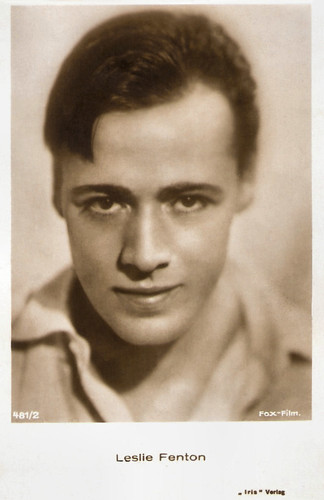
Austrian postcard by Iris Verlag, no. 481/2. Photo: Fox-Film.

German postcard by Ross Verlag, Berlin, no. 1335/1, 1927-1928. Photo: Fox.
The Road to Glory
Leslie Fenton was born in 1902 in Liverpool, Lancashire. In 1909, Fenton emigrated to America with his mother, Elizabeth Carter Fenton, and his brothers, to join his father, shoe manufacturer's representative Richard Fenton, in Mifflin, Ohio.
After an initial job as an office clerk, Leslie Fenton moved to New York and became a theatre actor. He enjoyed his first successes in the role of the teenage hero.
In the mid-1920s, Fenton was signed to Hollywood and received a contract with Fox Studios, for which he appeared in the film East Lynne (Emmett J. Flynn, 1925) with Alma Rubens and Edmund Lowe.
In The Road to Glory (Howard Hawks, 1926), he had the male lead opposite May McAvoy. This was Hawks' first film. For Fox, Fenton also appeared in What Price Glory (Raoul Walsh, 1926), starring Victor McLaglen, Dolores del Rio and Edmund Lowe.
Leslie Fenton also played at Paramount, e.g. in the silent crime drama The Drag Net (Josef von Sternberg, 1928), starring George Bancroft.

French postcard in the Les Vedettes de Cinéma series by A.N., Paris, no. 191. Photo: Fox Film.
The Streets of Laredo
Leslie Fenton appeared in a total of 62 feature films between 1923 and 1938, with Fenton usually given leading roles in B-movies and supporting roles in A productions. Probably his best-known performance today is as the dapper gangster boss Nails Nathan in the classic film The Public Enemy (William Wellman, 1931) with James Cagney, while he was also Cagney's antagonist in Lady Killer (Roy Del Ruth, 1933).
His career stagnated during the later 1930s. After a supporting role alongside Spencer Tracy as a murderer about to be executed in the opening scenes of Boys Town (Norman Taurog, 1938), he retired from acting.
Fenton went on to become a film director. By 1951 he had directed a total of 19 films. He made mainly B-movies in the Western and action genres, some of which film historians have subsequently regarded as well-directed entertainment films. Perhaps his best-known film today is the Western The Streets of Laredo (1949), starring William Holden. His career as a director ended as early as 1951 when he was not yet 50 years old.
In 1932 Fenton married actress Ann Dvorak, who followed him to England. There he stayed during the Second World War and achieved an officer's rank in the Royal Naval Reserve. He was seriously injured in Operation Chariot. Dvorak and Fenton divorced in 1945.
Leslie Fenton remarried in 1952 and the second marriage lasted until his death. Little is known about the last two and a half decades of Fenton's life. Leslie Fenton died in 1978 in Montecito, California, at the age of 76.

German postcard by Ross Verlag, Berlin, no. 7544/1, 1932-33. Ufa. Leslie Fenton as Capt. lt. Droste in the English language version of F.P.1 (Karl Hartl, 1933). The film was shot in 1932 at the Ufa studios in Berlin, as well as at the Hamburg Howaldt shipyard, in Cuxhaven and Warnemunde, as on platforms designed by Erik Kettelhut on the Baltic Sea island of Greifswalder Oie. While the German version already came out in 1932, the English version was released in 1933 in Britain by Gaumont-British and in the US by Fox.
Sources: Wikipedia (German and English) and IMDb.
No comments:
Post a Comment